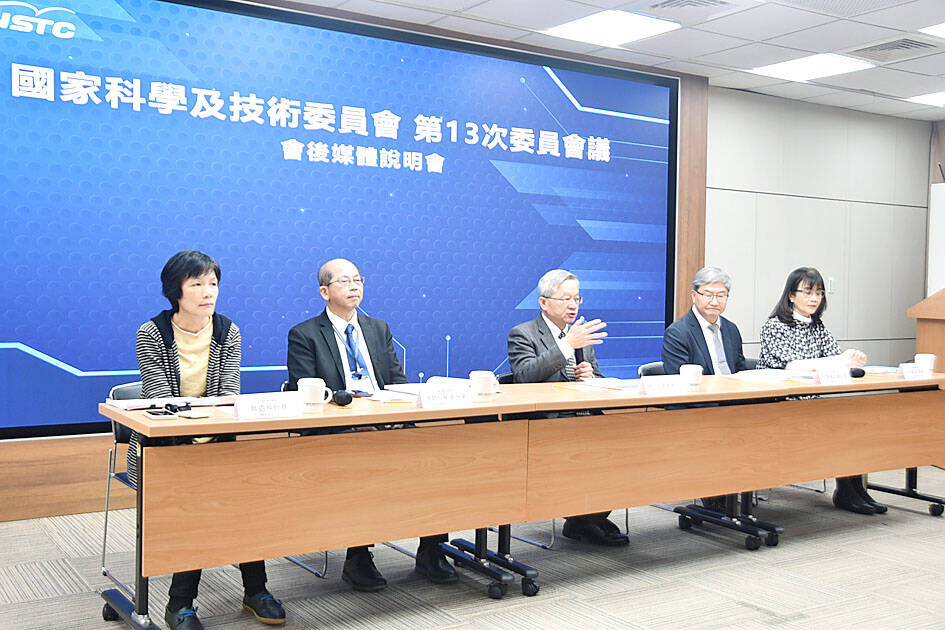The National Science and Technology Council yesterday proposed increasing the technology budget by about 13 percent next year to NT$180 billion (US$5.46 billion) to support the advancement of semiconductor, artificial intelligence (AI) and other industries with strategic importance.
This year, the government plans to spend a record-high budget of NT$159.5 billion on technology.
The new budget is part of the government’s efforts to enhance the nation’s technology prowess and to boost supply chain resilience, given growing competition and geopolitical risks.

Photo: Wu Po-hsuan, Taipei Times
The technology budget would be earmarked for the development of “five trusted industry sectors” proposed by President William Lai (賴清德), the council said.
The five trusted industry sectors include semiconductor, AI, defense, security, surveillance and next-generation communications.
The council would also fund the creation of a “Chips Team Taiwan” initiative to build a domestic chip supply chain to cope with future demand, it said.
A bulk portion of local semiconductor goods and services such as chip designing, wafers, chip testing and packaging services, aim to supply overseas customers, the council said.
“The increase in technology budget purports to cement Taiwan’s national strength. Taiwan should cooperate with other countries to build trusted supply chains, given growing geopolitical tensions,” National Science and Technology Council Minister Wu Cheng-wen (吳誠文) said.
“Investing in technology development will safeguard Taiwan’s industrial advancement and ensure that the nation can play a critical role in the supply chains among democratic countries,” he said.
The budget would also be spent on building large language model AI and sovereign AI, allowing the nation to gain the capabilities to produce AI using its own infrastructure, data, workforce and business networks, the council said.
The budget would also be used to fund existing projects such as the Taiwan Chip-based Industrial Innovation Program, net zero technology, the Taiwan AI Action Plan 2.0 and a new “Silicon Valley” project in southern Taiwan, it said.

Taiwan Semiconductor Manufacturing Co (TSMC, 台積電) yesterday said that its investment plan in Arizona is going according to schedule, following a local media report claiming that the company is planning to break ground on its third wafer fab in the US in June. In a statement, TSMC said it does not comment on market speculation, but that its investments in Arizona are proceeding well. TSMC is investing more than US$65 billion in Arizona to build three advanced wafer fabs. The first one has started production using the 4-nanometer (nm) process, while the second one would start mass production using the

A TAIWAN DEAL: TSMC is in early talks to fully operate Intel’s US semiconductor factories in a deal first raised by Trump officials, but Intel’s interest is uncertain Broadcom Inc has had informal talks with its advisers about making a bid for Intel Corp’s chip-design and marketing business, the Wall Street Journal reported, citing people familiar with the matter. Nothing has been submitted to Intel and Broadcom could decide not to pursue a deal, according to the Journal. Bloomberg News earlier reported that Taiwan Semiconductor Manufacturing Co (TSMC, 台積電) is in early talks for a controlling stake in Intel’s factories at the request of officials at US President Donald Trump’s administration, as the president looks to boost US manufacturing and maintain the country’s leadership in critical technologies. Trump officials raised the

‘SILVER LINING’: Although the news caused TSMC to fall on the local market, an analyst said that as tariffs are not set to go into effect until April, there is still time for negotiations US President Donald Trump on Tuesday said that he would likely impose tariffs on semiconductor, automobile and pharmaceutical imports of about 25 percent, with an announcement coming as soon as April 2 in a move that would represent a dramatic widening of the US leader’s trade war. “I probably will tell you that on April 2, but it’ll be in the neighborhood of 25 percent,” Trump told reporters at his Mar-a-Lago club when asked about his plan for auto tariffs. Asked about similar levies on pharmaceutical drugs and semiconductors, the president said that “it’ll be 25 percent and higher, and it’ll

CHIP BOOM: Revenue for the semiconductor industry is set to reach US$1 trillion by 2032, opening up opportunities for the chip pacakging and testing company, it said ASE Technology Holding Co (日月光投控), the world’s largest provider of outsourced semiconductor assembly and test (OSAT) services, yesterday launched a new advanced manufacturing facility in Penang, Malaysia, aiming to meet growing demand for emerging technologies such as generative artificial intelligence (AI) applications. The US$300 million facility is a critical step in expanding ASE’s global footprint, offering an alternative for customers from the US, Europe, Japan, South Korea and China to assemble and test chips outside of Taiwan amid efforts to diversify supply chains. The plant, the company’s fifth in Malaysia, is part of a strategic expansion plan that would more than triple